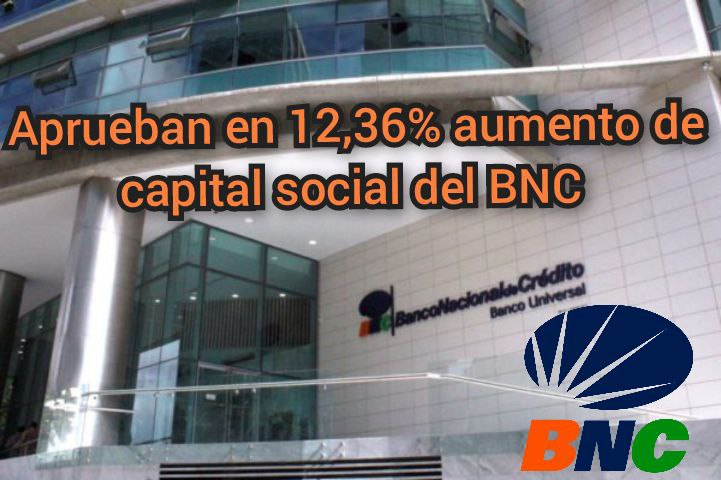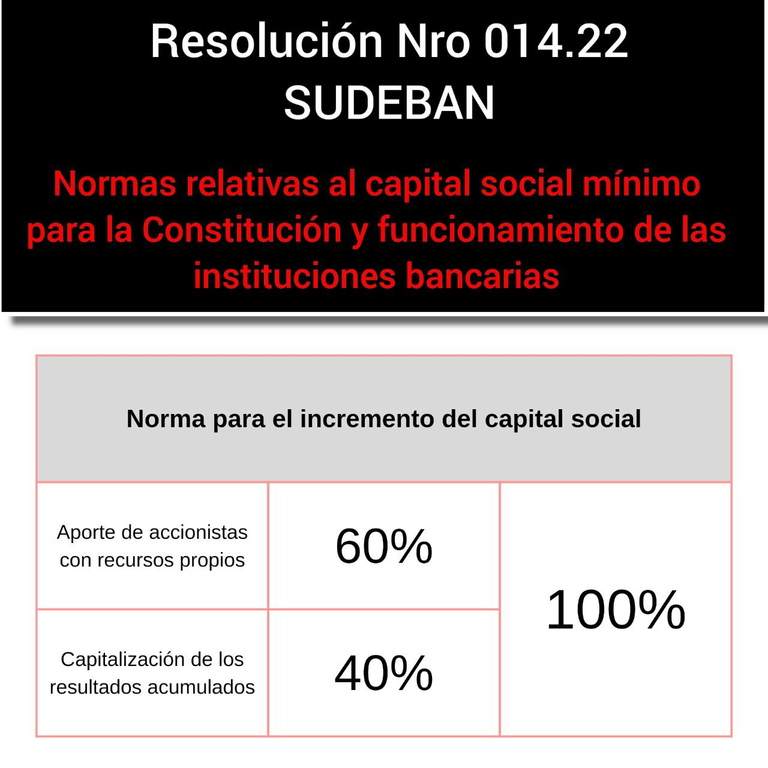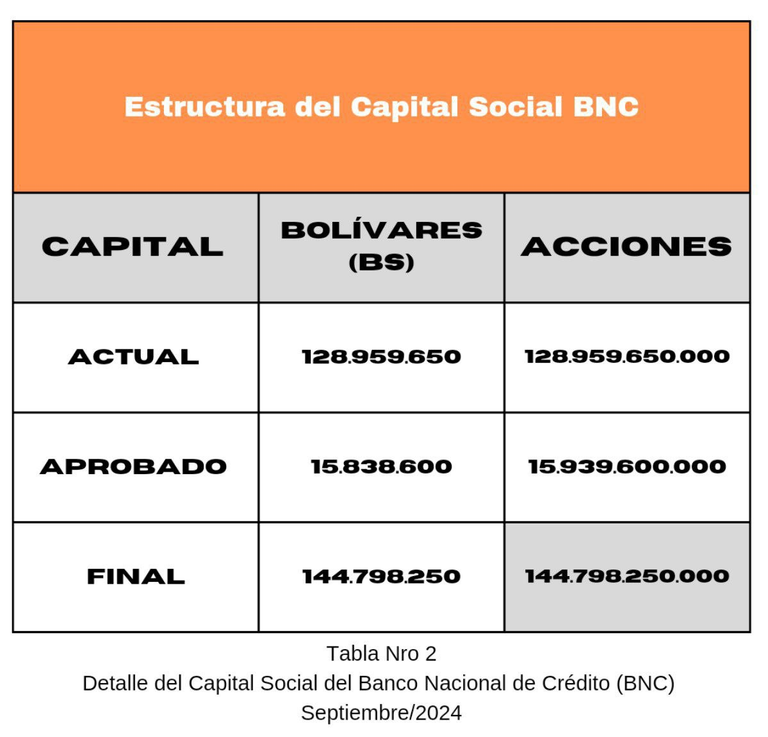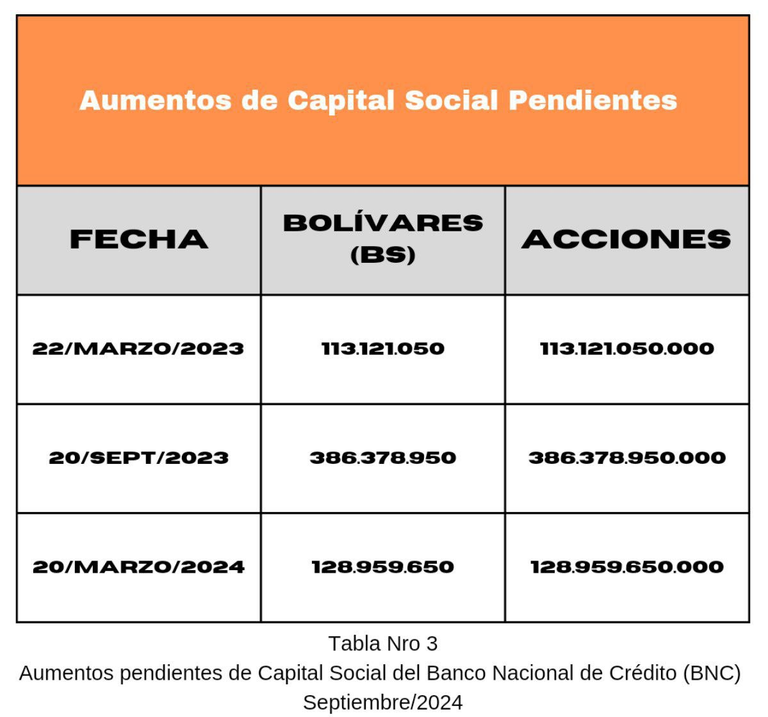
Cuando los accionistas de un banco en Venezuela deciden en asamblea aumentar su capital social, generalmente se realiza emitiendo nuevas acciones que son pagadas al valor nominal establecido en el Acta Constitutiva que, en el caso del BNC, es de 0,001 Bs. La Junta Directiva debe solicitar aprobación del aumento del capital social ante el organismo regulador de la actividad bancaria: SUDEBAN, ya que así lo establece la norma, y una vez que obtenga la aprobación se materializa emitiendo nuevas acciones que se sumarán a las ya existentes.
! [ENGLISH VERSION click here] THE INCREASE OF THE CAPITAL STOCK OF BANCO NACIONAL DE CREDITO (BNC) HAS BEEN AUTHORIZED BY SUDEBAN and SUNAVAL
At the Ordinary Shareholders' Meeting of Banco Nacional de Crédito (BNC), held on September 21, 2022, a proposal to increase the capital stock by Bs. 15,838,600.00 was approved. According to Article 280 of the current Commercial Code, in order to increase the capital stock of a company, the presence at the Meeting of at least 3/4 of the capital stock and the favorable vote of those present is required, unless the company's bylaws provide for another parameter, a requirement that was met. The Board of Directors was also authorized to carry out the material and legal acts necessary to execute the decision of such Assembly.
When the shareholders of a bank in Venezuela decide in a meeting to increase its capital stock, it is generally done by issuing new shares which are paid at the nominal value established in the Articles of Incorporation which, in the case of BNC, is Bs. 0.001. The Board of Directors must request approval of the capital stock increase before the banking regulatory agency: SUDEBAN, since this is established by law, and once approval is obtained, new shares are issued which will be added to the existing ones.
¿Por qué se aumenta el capital social del banco?
Son innumerables las razones por las cuales una compañía decide aumentar su capital social. Algunas por exigencias legales, otras por razones económicas que benefician a los accionistas y otras para actualizar los valores contables por los efectos de la inflación que vive en nuestro país. En este artículo analizaré algunas de ellas:
1) CAPITAL SOCIAL MÍNIMO PARA LA CONSTITUCIÓN Y FUNCIONAMIENTO DE LAS INSTITUCIONES BANCARIAS
De acuerdo a lo establecido en las “Normas relativas al Capital Social Mínimo para la Constitución y Funcionamiento de las Instituciones Bancarias” establecida por la SUDEBAN en la Resolución N°014.22 de fecha 10 de marzo de 2022 y publicada en Gaceta Oficial N°42.412, de fecha 6 de julio de 2022, las Instituciones del Sector Bancario para funcionar requieren un capital social mínimo, suscrito y pagado totalmente en dinero en efectivo, no menor del equivalente al 3% del Total del Activo expresado en el Balance General de Publicación.
El activo de las instituciones bancarias crece mes a mes gracias a las actividades relativas al sector financiero que desempeñan, además del aumento de la masa monetaria en el país y la inflación que conlleva a precios cada vez mayores de los bienes. Por lo que aunque las mismas normas indican que “el capital social para funcionar y operar deberá ajustarse en lo sucesivo de forma anual, durante los primeros 6 meses de cada año, considerando el Total del Activo reflejado en los estados financieros correspondientes al cierre económico finalizado el 31 de diciembre del año inmediato anterior”, la realidad es que al menos cada 6 meses (tiempo de duración de cada ejercicio económico fiscal de la banca) se debe aumentar el capital para cubrir ese 3% del total del activo.
2) PÉRDIDA DEL VALOR PATRIMONIAL CONTABLE POR INFLACIÓN Y REEXPRESIÓN MONETARIA
El capital social de todas las compañías en Venezuela se ha visto reducido nominalmente en términos contables por efectos de la inflación, la devaluación y las reconversiones monetarias del bolívar, que es nuestra moneda de curso legal, para reexpresar monetariamente los montos que crecieron exponencialmente a causa de estos efectos. Aunque si bien es cierto que los activos de las compañías que están representados por bienes muebles e inmuebles, tangibles e intangibles y de cualquier otra índole, siguen estando presente en los balances.
Estos fenómenos económicos en nuestro país han causado distorsión en las expresiones monetarias, por lo que el valor nominal de una acción del Banco Nacional de Crédito (BNC), es de 0.001 bolívar. No existe una manera de realizar pago alguno por un monto de esta naturaleza, ya que el bolívar es fungible en sólo 100 partes iguales, a la que cada una se le llama céntimo.
Es decir, un bolívar equivale a 100 céntimos. Pero el valor nominal de una acción del banco es de una milésima de bolívar y no existen billetes o monedas físicas para realizar una transacción por ese monto y tampoco existe posibilidad de hacerlo vía digital a través de una transferencia bancaria. Por lo que, aumentar el capital social, es necesario para adecuar las expresiones contables en los balances.
! [ENGLISH VERSION click here] Why is the bank's capital stock being increased?
There are countless reasons why a company decides to increase its capital stock. Some of them are due to legal requirements, others for economic reasons that benefit the shareholders and others to update the accounting values due to the effects of inflation in our country. In this article I will analyze some of them:
- MINIMUM CAPITAL STOCK FOR THE INCORPORATION AND OPERATION OF BANKING INSTITUTIONS.
According to the “Norms regarding the Minimum Capital Stock for the Incorporation and Operation of Banking Institutions” established by SUDEBAN in Resolution N°014.22 dated March 10, 2022 and published in Official Gazette N°42.412, dated July 6, 2022, the Banking Sector Institutions require a minimum capital stock, fully subscribed and paid in cash, not less than the equivalent of 3% of the Total Assets expressed in the Publication Balance Sheet, in order to operate.
The assets of banking institutions grow month by month due to the activities related to the financial sector they perform, in addition to the increase of the monetary mass in the country and the inflation that leads to higher and higher prices of goods. Therefore, although the same norms indicate that “the capital stock to function and operate must be adjusted annually thereafter, during the first 6 months of each year, considering the Total Assets reflected in the financial statements corresponding to the economic closing ending on December 31 of the immediately preceding year”, the reality is that at least every 6 months (the duration of each banking fiscal fiscal year) the capital must be increased to cover that 3% of the total assets.- LOSS OF BOOK EQUITY VALUE DUE TO INFLATION AND MONETARY RESTATEMENT
The capital stock of all companies in Venezuela has been reduced nominally in accounting terms due to the effects of inflation, devaluation and monetary reconversions of the bolivar, which is our legal tender, in order to monetarily restate the amounts that grew exponentially due to these effects. Although it is true that the assets of the companies, which are represented by real and personal property, tangible and intangible, and of any other kind, are still present in the balance sheets, these economic phenomena in our country have increased exponentially due to these effects.
These economic phenomena in our country have caused distortion in the monetary expressions, so that the nominal value of a share of Banco Nacional de Crédito (BNC) is 0.001 bolivar. There is no way to make any payment for an amount of this nature, since the bolivar is fungible in only 100 equal parts, each of which is called a cent.
In other words, one bolivar is equivalent to 100 cents. But the nominal value of a bank share is one thousandth of a bolivar and there are no physical bills or coins to make a transaction for that amount and there is no possibility of doing it digitally through a bank transfer. Therefore, it is necessary to increase the capital stock in order to adjust the accounting expressions in the balance sheets.
Aunque fue el 21 de septiembre de 2022 cuando los accionistas decidieron en Asamblea aumentar el capital social, no fue hasta el 23 de agosto de 2024 (casi 2 años después) que se conoció que el aumento fue aprobado por las autoridades: SUDEBAN y SUNAVAL gracias a una publicación de prensa en la página web de la BOLSA DE VALORES DE CARACAS.
Es acá cuando nos preguntamos la razón por la cual, aunque la banca decide cumplir con las normas, ¿Por qué el Ente Regulador decide aprobar tardíamente el cumplimiento? Por lo que podemos especular que es un mecanismo del Estado para limitar el crecimiento de los haberes patrimoniales de los accionistas de los bancos.
Ya que en la misma norma se establece que estos incrementos deben ser realizados en al menos un 60%, con aportes en dinero en efectivo con recursos propios de los inversionistas y el otro 40% restante se pueden utilizar los recursos provenientes de los resultados acumulados del mismo banco. Es decir, que se capitalizan las ganancias o utilidad de cada ejercicio económico fiscal.

! [ENGLISH VERSION click here] Although it was on September 21, 2022 when the shareholders decided in Assembly to increase the capital stock, it was not until August 23, 2024 (almost 2 years later) that it was known that the increase was approved by the authorities: SUDEBAN and SUNAVAL thanks to a press publication on the web page of the CARACAS SECURITIES EXCHANGE
It is here when we ask ourselves the reason why, although the banks decide to comply with the norms, why the Regulatory Entity decides to approve the compliance late? We can speculate that it is a mechanism of the State to limit the growth of the patrimonial assets of the banks' shareholders.
Since the same regulation establishes that at least 60% of these increases must be made with cash contributions from the investors' own resources and the remaining 40% can be made with resources from the accumulated results of the bank itself. In other words, the earnings or profits of each fiscal year are capitalized.
¿Cómo se traduce esto?
Que la utilidad que tiene cada banco, el 60% se debe transferir en dinero efectivo a cada uno de sus accionistas en forma de dividendos y sólo el 40% puede utilizarse para reinvertirse, agregándolo al capital social para hacer crecer el banco. Pero ese mismo 60% que reciben los accionistas en su cuenta bancaria como dividendos, pueden acto seguido utilizarlo para suscribir y pagar las nuevas acciones que se emitan gracias al aumento del capital social.
Por lo que el banco crecerá sin que los accionistas deban colocar un solo bolívar de su bolsillo; y en el caso de los bancos cuyas acciones están inscritas en una pizarra de cotizaciones de cualquier Bolsa de Valores en nuestro país, los accionistas podrán luego colocarlas en venta al precio de mercado. Es un negocio redondo para los accionistas y las autoridades al retrasar las debidas diligencias, también están retrasando las ganancias de los accionistas o dueños de los bancos.
El aumento en cuestión.
El aumento de capital aprobado por la Asamblea Ordinaria el 21 de septiembre de 2022, fue hasta por un máximo de Bs.15.838.600,00 y como dicho aumento se realiza emitiendo nuevas acciones al valor nominal (0,001 Bs c/u), se emitirán 15.838.600.000 nuevas acciones. Es decir, un aumento de 12,36% en el número de acciones actualmente en circulación.
Como estas acciones que están por emitirse ya han sido suscritas y pagadas en la fecha de la Asamblea, cada accionista actual recibirá el equivalente al 12,36% de las acciones que posee actualmente en el banco, en la fecha límite de transacción con beneficio que será anunciado en los próximos días por el banco, una vez que se tengan los actos materiales listos para ejecutarse.

¿Qué sucede con los accionistas que han adquirido acciones del banco después de la fecha de la Asamblea?
Sin importar la fecha en la que una persona haya adquirido acciones del banco, todo aquel accionista inscrito en el libro de accionistas para la fecha que se anuncia, recibirá en su cuenta de la Caja Venezolana de Valores, la cantidad de acciones que le corresponda de acuerdo a su porcentaje accionario. Por ejemplo: si Pedro Pérez compró hoy el 1% de las acciones totales en circulación del banco y mañana fuera la ejecución de la distribución de las nuevas acciones a emitir, entonces Pedro Pérez recibiría mañana 1% de esas nuevas acciones a emitir.
Los accionistas de empresas como por ejemplo el Banco Nacional de Crédito (BNC), son inversionistas que han colocado parte de su patrimonio, de su capital, de su riqueza personal/familiar en un activo financiero que les permita principalmente la protección de su patrimonio.
Es decir, el poder de compra de bienes, productos y servicios; y en segundo lugar, obtener una utilidad que viene dada tanto en crecimiento de ese mismo valor e incluso obtener ingresos por rentas o dividendos de forma periódica y este aumento del capital social del banco es una muestra de la utilidad que puede tener un inversionista en solo una de las empresas emisoras de títulos valores que están listadas en la Bolsa de Valores de Caracas.
! [ENGLISH VERSION click here] What does this mean?.
That 60% of the profit of each bank must be transferred in cash to each of its shareholders in the form of dividends and only 40% can be used for reinvestment, adding it to the capital stock to make the bank grow. But that same 60% that the shareholders receive in their bank account as dividends, they can then use it to subscribe and pay for the new shares that are issued thanks to the increase in capital stock.Therefore, the bank will grow without the shareholders having to put a single bolivar out of their pockets; and in the case of banks whose shares are registered in a stock exchange of any stock exchange in our country, the shareholders will be able to sell them at market price. It is a round business for the shareholders and the authorities, by delaying the due diligence, are also delaying the profits of the shareholders or owners of the banks.
THE INCREASE IN QUESTION
The capital increase approved by the Ordinary Shareholders' Meeting on September 21, 2022, was up to a maximum of Bs.15,838,600.00 and since such increase is made by issuing new shares at par value (0.001 Bs each), 15,939,600,000 new shares will be issued. That is, an increase of 12.36% in the number of shares currently outstanding.
As these shares to be issued have already been subscribed and paid on the date of the Meeting, each current shareholder will receive the equivalent of 12.36% of the shares he/she currently holds in the bank, on the transaction deadline date with benefit that will be announced in the next few days by the bank, once the material acts are ready to be executed.
What happens to shareholders who have acquired shares of the bank after the date of the Meeting?
Regardless of the date on which a person has acquired shares of the bank, any shareholder registered in the shareholders' book on the date announced will receive in his account at Caja Venezolana de Valores, the amount of shares that corresponds to him according to his shareholding percentage. For example: if Pedro Perez bought today 1% of the total outstanding shares of the bank and tomorrow was the execution of the distribution of the new shares to be issued, then Pedro Perez would receive tomorrow 1% of those new shares to be issued.
The shareholders of companies such as Banco Nacional de Crédito (BNC), for example, are investors who have placed part of their patrimony, of their capital, of their personal/family wealth in a financial asset that mainly allows them to protect their patrimony.
That is to say, the power to purchase goods, products and services; and secondly, to obtain a profit that is given both in growth of that same value and even to obtain income from rents or dividends periodically and this increase of the bank's capital stock is a sample of the profit that an investor can have in just one of the companies issuing securities that are listed in the Caracas Stock Exchange.
Este no es el único aumento de capital social que se ha aprobado por los accionistas del banco. Hay tres aumentos que aún están pendientes por ser aprobados por los entes reguladores. Una vez que se reciba dicha autorización, los inversionistas que posean acciones de este banco también recibirán acciones nuevas en sus haberes sin que hayan tenido que pagarlas. Algo que se traduce directamente en la conservación de su porcentaje accionario dentro de la empresa.

Luego de todo lo analizado, ¿Tienes alguna duda, pregunta o comentario sobre este artículo? En la caja de comentarios te podré dar más detalles y estaré realizando un live en los próximos días para explicarlo mejor. Debes estar atento a mis redes sociales para no perderte la información.
Si quieres aprender a comprar acciones, no sólo de este banco sino de cualquiera de las empresas venezolanas que están listadas en la pizarra de cotizaciones de la Bolsa de Valores de Caracas, recuerda que tengo disponible mi Taller de Iniciación a la Inversión en la Bolsa de Valores de Caracas, que puedes solicitarme directamente al privado.
Mi nombre es Manuel Sánchez, comerciante, emprendedor, inversionista y apasionado de las finanzas personales y me dedico a compartir lo que he aprendido en este viaje a la libertad financiera.
Tablas e imagenes diseñadas y construidas por mi en Canva tomando información de la resolución Nro 014.22 de SUDEBAN de fecha 10/03/2022, de la nota de prensa publicada en la BVC el 23/08/2024 contentiva de la aprobación del aumento de capital al BNC y de Asambleas de accionistas en el año 2.023 y 2.024
! [ENGLISH VERSION click here] This is not the only capital increase that has been approved by the bank's shareholders. There are three increases that are still pending approval by the regulators. And once such authorization is received, investors who own shares of this bank will also receive new shares in their holdings without having to pay for them. This translates directly into the preservation of their shareholding percentage within the company.
After all that has been analyzed, do you have any doubts, questions or comments about this article? In the comments box I will be able to give you more details and I will be doing a live in the coming days to explain it better. You should stay tuned to my social networks so you don't miss the information.
And if you want to learn how to buy shares, not only of this bank but of any of the Venezuelan companies listed on the Caracas Stock Exchange, remember that I have available my Workshop on Initiation to Investing in the Caracas Stock Exchange, which you can request directly to my direct message.My name is Manuel Sanchez, a trader, entrepreneur, investor and personal finance enthusiast, and I am dedicated to sharing what I have learned on my journey to financial freedom.
Tables and images designed and built by me in Canva taking information from the SUDEBAN resolution No. 014.22 dated 10/03/2022, from the press release published in the BVC on 08/23/2024 containing the approval of the capital increase to the BNC and from shareholders meetings in the year 2.023 and 2.024.



